"With a Little Help from My Friends" is a song recorded by English rock band the Beatles for their 1967 album Sgt. Pepper's Lonely Hearts Club Band. It was written primarily by Paul McCartney with contributions from John Lennon, and is sung by drummer Ringo Starr, his lead vocal for the album. As the second track on the album, it segues from the applause on the title track.

Badfinger were a Welsh rock band formed in 1961 in Swansea, Wales. Their best-known lineup consisted of Pete Ham (guitar), Mike Gibbins (drums), Tom Evans (bass), and Joey Molland (guitar). They are recognised for their influence on the 1970s power pop genre. It is estimated that the band sold 14 million records.

No Dice is the third studio album by British rock band Badfinger, issued by Apple Records and released on 9 November 1970. Their second album under the Badfinger name, but their first official album under that name, and first to include guitarist Joey Molland, No Dice significantly expanded the British group's popularity, especially abroad. The album included both the hit single "No Matter What" and the song "Without You", which would become a big hit for Harry Nilsson, and later a hit for Mariah Carey.

Straight Up is the fourth studio album by the Welsh rock band Badfinger, released in December 1971 in the United States and February 1972 in Britain. Issued on the Beatles' Apple record label, it includes the hit singles "Day After Day" and "Baby Blue", and the similarly popular "Name of the Game", all of which were written by singer and guitarist Pete Ham. The album marked a departure from the more rock-oriented sound of Badfinger's previous releases, partly as a result of intervention by Apple Records regarding the band's musical direction.

Peter William Ham was a Welsh singer, songwriter and guitarist best known as a lead vocalist of and composer for the 1970s rock band Badfinger, whose hit songs include "No Matter What", "Day After Day" and "Baby Blue". He also co-wrote the ballad "Without You", a worldwide number-one hit for Harry Nilsson that has become a standard covered by hundreds of artists. Ham was granted two Ivor Novello Awards related to the song in 1973.
"Without You" is a song written by Pete Ham and Tom Evans of British rock group Badfinger, and first released on their 1970 album No Dice. The power ballad has been recorded by over 180 artists, and versions released as singles by Harry Nilsson (1971) and Mariah Carey (1994) became international number one hits. The Nilsson version was included in 2021's Rolling Stone's 500 Greatest Songs of All Time. Paul McCartney once described it as "the killer song of all time".

Apple Corps Limited is a multi-armed multimedia corporation founded in London in January 1968 by the members of The Beatles to replace their earlier company and to form a conglomerate. The name is a pun for its pronunciation "apple core". Its chief division is Apple Records, which was launched in the same year. Other divisions included Apple Electronics, Apple Films, Apple Publishing and Apple Retail, whose most notable venture was the short-lived Apple Boutique, on the corner of Baker Street and Paddington Street in central London. Apple's headquarters in the late 1960s was at the upper floors of 94 Baker Street, after that at 95 Wigmore Street, and subsequently at 3 Savile Row. The last of these addresses was also known as the Apple Building, which was home to the Apple studio.

"Maxwell's Silver Hammer" is a song by the English rock band the Beatles from their 1969 album Abbey Road. It was written by Paul McCartney and credited to the Lennon–McCartney partnership. The song is about a student named Maxwell Edison who commits murders with a hammer, with the dark lyrics disguised by an upbeat sound. McCartney described the song as symbolic of the downfalls of life, being "my analogy for when something goes wrong out of the blue, as it so often does".
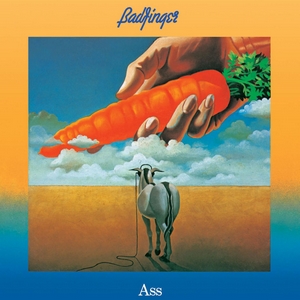
Ass is the fifth studio album by British rock band Badfinger, and their last album released on Apple Records. The opening track, "Apple of My Eye", refers to the band leaving the label to begin its new contract with Warner Bros. Records.
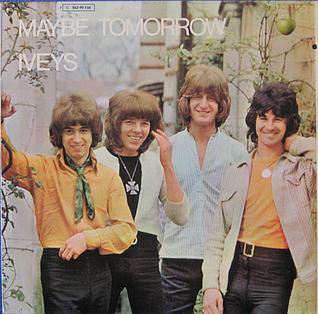
Maybe Tomorrow is the debut album by British rock band Badfinger. Maybe Tomorrow is the only release under the band's original name as The Iveys. It was issued in 1969 on the Apple label in Japan, West Germany and Italy. Although the album was scheduled to be released worldwide, the release in the US and UK at that time was halted without explanation. Many reasons for halting the album have been suggested by the band and Apple employees, but the most common theory is that Apple's newly hired president, Allen Klein, stopped all non-Beatle releases on Apple until he could examine the company's finances, which were in disarray at the time.
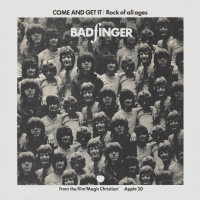
"Come and Get It" is a song composed by English singer-songwriter Paul McCartney for the 1969 film The Magic Christian. The song was performed by Badfinger, produced by McCartney and issued as a single 5 December 1969 in the UK, and 12 January 1970 in the US, on the Beatles' Apple label. It was the band's first release under the Badfinger name and was their international breakthrough, hitting the top 10 in both the UK and US singles charts.
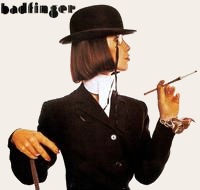
Badfinger is the sixth studio album by British rock band Badfinger. The album was recorded in autumn 1973 and released in 1974 on Warner Bros. Records. It was the first of two albums released by the band on the Warner label. The cover art for the album shows a woman wearing a riding outfit and hat from the 1920s and smoking a cigarette in a cigarette holder.
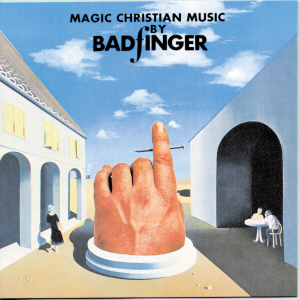
Magic Christian Music is the second studio album by the British rock band Badfinger, released on 9 January 1970 on Apple Records. It was their first release under the Badfinger name, having previously released the album Maybe Tomorrow in 1969 under the name The Iveys. It includes the band's first international hit, "Come and Get It", written and produced for them by Paul McCartney.

"No Matter What" is a song originally recorded by Badfinger for their album No Dice in 1970, written and sung by Pete Ham and produced by Mal Evans.

Thomas Evans was an English musician. He is best known for his work as the bassist of the band Badfinger. He also co-wrote their 1970 song "Without You," which has been recorded by over 180 artists — most notably Harry Nilsson and Mariah Carey. Evans died by suicide in 1983, one of two members to do so.

"Baby Blue" is a song by Welsh rock band Badfinger from their fourth studio album, Straight Up (1971). The song was written by Pete Ham, produced by Todd Rundgren, and released on Apple Records. As a single in the US in 1972, it went to #14.

"Maybe Tomorrow" is a song composed and sung by guitarist Tom Evans of The Iveys, which was released as the group's first worldwide single on Apple Records. It also served as the title track for the album Maybe Tomorrow, and it was also included on the Badfinger album Magic Christian Music released in 1970.
"Carry on Till Tomorrow" is a song written by Tom Evans and Pete Ham that was first released on Badfinger's 1970 album Magic Christian Music. It was also used in the film The Magic Christian, starring Ringo Starr and Peter Sellers. An edited version was later used as the b-side of Badfinger's single "No Matter What" in the United States.
"We're for the Dark" is a song written by Pete Ham that was released as the closing track on Badfinger's 1970 album No Dice. It was covered by Loud Family.

Brother is the debut album by the American pop-rock duo Lon & Derrek Van Eaton. It was released on the Beatles' Apple record label in September 1972 in the United States and February 1973 in Britain. It includes the single "Sweet Music", produced by George Harrison, and was otherwise produced by Klaus Voormann, a friend and longtime associate of the Beatles. On release, the album received favorable reviews from music critics but failed to achieve commercial success. Rolling Stone critic Stephen Holden hailed it as a "staggeringly impressive first album".















